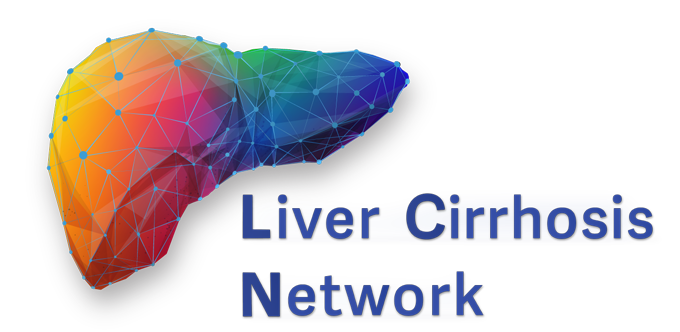About the Network
Helping people
living with
cirrhosis
stay healthy.
The Liver Cirrhosis Network (LCN) brings together 10 leading institutions with expertise in caring for patients with cirrhosis. Cirrhosis is common cause of death and disability in the U.S.
The LCN was formed for two reasons. First, we hope to discover why and how patients with cirrhosis get sick with complications of cirrhosis. Second, we will launch a trial to see if a statin improves the health of patients with cirrhosis.
Explore the Network
The structure of the LCN consists of a Scientific Data Coordinating Center (SDCC) and 10 clinical centers. The LCN is sponsored by the National Institute of Diabetes and Digestive and Kidney Diseases (NIDDK), a division of the National Institutes of Health. The Network is also supported by National Cancer Institute (NCI) and National Institute on Alcohol Abuse and Alcoholism (NIAAA).
The Network

![]()

![]()

![]()
![]()
![]()
![]()
![]()

This is the Scientific and Data
Coordination Center.
Cleveland Clinic

Cleveland Clinic
9500 Euclid Avenue
Cleveland, Ohio 44195
Nicole Welch
welchn@ccf.org
Srinivasan Dasarathy
dasaras@ccf.org
Annette Bellar
bellara@ccf.org
Send a message to the Cleveland Clinic team.
Columbia University

Columbia University Irving School of Medicine
622 West 168th Street
New York, NY 10031
Theresa Lukose
tt2103@cumc.columbia.edu
Elizabeth Verna
ev77@cumc.columbia.edu
Rebecca Yeh
ry2334@cumc.columbia.edu
Send a message to the Columbia University Irving School of Medicine team.
Cornell University

Cornell University – New York Presbyterian
1305 York Avenue, 4th Floor
New York, NY 10021
Robert S. Brown
rsb2005@med.cornell.edu
Cecilia Mero
cmm2002@med.cornell.edu
Send a message to the Cornell University team.
Duke University

Duke Liver Center
40 Duke Medicine Circle Clinic 2J
Durham, NC 27710
Lauren Roberson
lauren.roberson@duke.edu
Mariko Kopping
mariko.kopping@duke.edu
Send a message to the Duke University team.
Mayo Clinic

Mayo Clinic
200 First Street Sw
Rochester, MN 55901
Amy Olofson
olofson.amy@mayo.edu
Send a message to the Mayo Clinic team.
University of Miami

University of Miami Health System
1295 Northwest 14th Street
Building Ste A
Miami, FL 33125
David Goldberg
dsgoldberg@med.miami.edu
Patricia Jones
pdjones@med.miami.edu
Jose Armando Gonzales Zamora
jxg1416@med.miami.edu
Cindy Delgado
cdelgado5@med.miami.edu
Damian Cohen
dac390@med.miami.edu
Eugenia Manrique
eim17@med.miami.edu
Ella Pokrifka
enp30@miami.edu
Send a message to the University of Miami team.
University of Michigan

University of Michigan
1500 E Medical Center Dr.
Ann Arbor, MI 48109
Elliot Tapper
etapper@med.umich.edu
Neehar Parikh
ndparikh@med.umich.edu
Samantha Nikirk
samjwalk@med.umich.edu
Send a message to the University of Michigan team.
University of California San Diego

University of California San Diego NAFLD Research Center
9452 Medical Center Dr.
1W502C6
La Jolla, CA 92037
Egbert Madambal
emadamba@health.ucsd.edu
Harris Siddiqi
hsiddiqi@health.ucsd.edu
Christie Hernandez
chh006@health.ucsd.edu
Send a message to the University of California San Diego team.
University of California San Francisco - UCSF Medical Center

UCSF Medical Center
400 Parnassus
San Francisco CA, 94143
Jiries Harb
Jiries.Harb@ucsf.edu
Send a message to the University of California San Francisco Medical Center team.
University of California San Francisco - Zuckerberg San Francisco General Hospital


UCSF/Zuckerberg San Francisco General Hospital
1001 Potrero Ave, Building 5
San Francisco, CA, 94110
Adele Viviani
adele.viviani@ucsf.edu
Skylar Weiss
skylar.weiss@ucsf.edu
Andrea Xu
andrea.xu@ucsf.edu
Send a message to the UCSF – Zuckerberg San Francisco General Hospital team.
University of Southern California - Keck Medical Center

Keck Medical Center of USC
1500 San Pablo St.
Los Angeles CA 90033
Alberto Munoz
alberto.munoz@med.usc.edu
(323) 442-0486
Send a message to the USC Keck Medical Center team.
University of Southern California - LAC and USC Medical Center

LAC+USC Medical Center
2051 Marengo St.
Los Angeles, CA 90033
Alberto Munoz
alberto.munoz@med.usc.edu
(323) 442-0486
Send a message to the LAC and USC Medical Center team.
Virginia Commonwealth University

VCU Health Clinical Research Services Unit
1300 East Marshall Street
North Hospital, 8th Floor
Richmond, VA 23298
Virginia Commonwealth University
Division of Gastroenterology, Hepatology and Nutrition
1200 East Broad Street, 14th Floor
PO Box 980341
Richmond, VA 23298
Falgun Patel
Falgun.patel@vcuhealth.org
Send a message to the Virginia Commonwealth University team.
Virginia Commonwealth University - Central Virginia Veterans Healthcare System

Central Virginia Veterans Healthcare System
1201 Broad Rock Blvd.
Richmond, VA 23249
Andrew Fagan
andrew.fagan@va.gov
Send a message to the Central Virginia Veterans Healthcare System
Partnership of Participating Organizations

